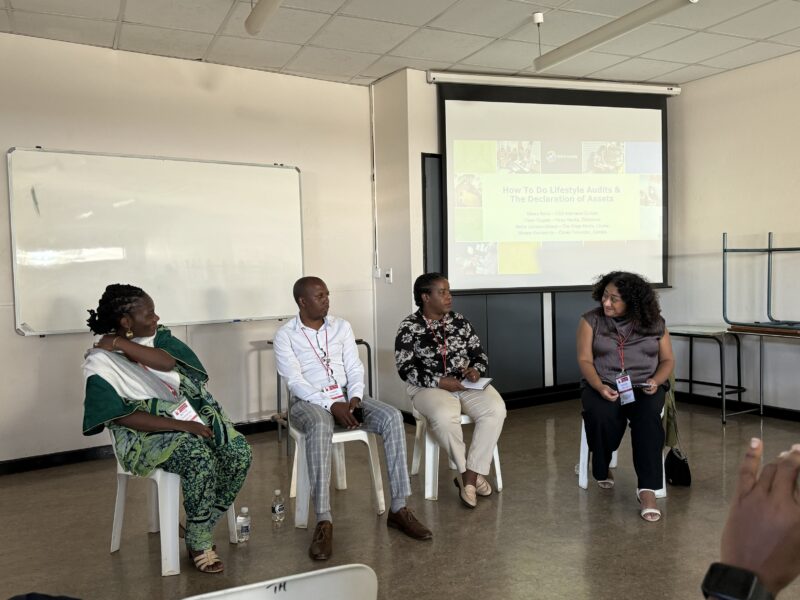Internews has just returned from an incredible three days at the 20th Annual African Investigative Journalism Conference (AIJC) in Johannesburg, which brings together investigative journalists, trainers and media experts from around the world.
While at AIJC, the role of lifestyle audits – that is, investigating the lifestyle and assets of those in power or associated with government – in exposing corruption was the focus of a panel discussion hosted by Meera Selva, CEO of Internews Europe. The panel included Mwape Kumwenda of Crown TV in Zambia, Owen Gagare of the News Hawks in Zimbabwe, and Bettie Johnson Mbayo of The Stage Media in Liberia, all of whom have carried out impactful investigations into their countries’ political leaders. The conversation explored the importance of lifestyle audits, the challenges journalists face in executing them, and the impact they can have on public trust and accountability.
Accountability and Representation
Opening the discussion, Selva drew a parallel between the famous “MPs’ expenses scandal” in the United Kingdom, where leaked information exposed questionable expenses by Members of Parliament and sparked a nationwide conversation about ensuring integrity and transparency in public service. Selva emphasised that lifestyle audits are not just tools for detecting corruption but essential mechanisms for ensuring leaders’ lifestyles represent the standards that the public expects.
According to Selva, lifestyle audits reveal if leaders are living within the means of their official salaries or if they are amassing unexplained wealth—a red flag that often points to potential corruption. However, she acknowledged the challenges that journalists face in tracking these discrepancies, especially as corruption networks grow more sophisticated and multinational.
Investigative Journalism as a Pillar of Accountability
The panellists each offered personal insights from their respective experiences investigating corruption within governments. These investigations revealed the hidden mechanisms of abuse of power and the struggles journalists face when holding those in power accountable.
Kumwenda shared the findings of a long-term investigation into a Zambian Member of Parliament (MP) who allegedly diverted constituency development funds for personal gain. Kumwenda highlighted that the lack of transparency in asset declarations allowed this individual to continue to rise through the political ranks despite facing accusations of misconduct. For more than a decade, Kumwenda uncovered evidence that proved the MP’s corruption, only for it to be ignored by the authorities. After tirelessly seeking further evidence, the MP was dismissed and later jailed. Kumwenda emphasised that lifestyle audits, if mandated and made public, can prevent such abuses before they affect the public purse.
Gagare shared a story of high-level corruption involving the Zimbabwe Electoral Commission and a South African company. The investigation, sparked by unusual spending patterns of prominent figures, unveiled a complex web of inflated contracts and unauthorised transactions. Gagare explained that lifestyle indicators such as exorbitant spending on luxury cars, houses, and gifts, are crucial clues. His report revealed corruption at multiple government levels, implicating individuals connected to the highest offices. Despite the pushback, Gagare’s persistence exposed how lifestyle audits, even informal ones, can serve as powerful tools for unveiling systemic corruption. Gagare also shared how divorce cases often expose undeclared assets and wealth as disgruntled partners fight for ill begotten assets and wealth. Lastly, Gagare spoke about the concept of “no honour amongst thieves” and shared how those who haven’t benefitted from corruption as much as they would have liked are often a source of information in an investigation.
Johson Mbayo described her investigation into Liberian senators who had served lengthy terms and were vying for re-election despite allegations of corruption. Her investigation uncovered inconsistencies in asset declarations, with officials underreporting their wealth and hiding assets through family members. Mbayo’s experience highlighted the legal and bureaucratic hurdles journalists face in accessing asset declaration information, despite official mechanisms in place for the reporting of private wealth. Using social media and public interviews, her investigation successfully highlighted the brazen attitude of the officials, who all seemed oblivious to the consequences of flaunting their flashy lifestyles.
Challenges to Lifestyle Audits: Privacy Laws and Political Influence
While lifestyle audits are crucial tools for public accountability, the panellists highlighted significant challenges. In most cases, access to officials’ financial information is restricted, with privacy laws shielding assets from public scrutiny. As Kumwenda noted, in Zambia, existing laws do not require public disclosure of assets, limiting journalists’ access to information. Similarly, Mbayo described how Liberia’s Anti-Corruption Commission’s declarations are kept confidential, making it almost impossible for journalists to conduct thorough lifestyle audits without resorting to alternative methods like social media and information from local communities.
Gagare discussed how political connections often protect individuals from the consequences of their actions. Despite mounting evidence of corruption, individuals involved in his story faced limited repercussions due to their high-ranking connections. These insights reveal the fundamental issue: without legislative reforms that mandate transparent disclosures, lifestyle audits will continue to face obstacles.
The Need for Legislative Reforms and Public Demand
Selva spoke about the need for a legislative overhaul that mandates asset disclosures and supports lifestyle audits as standard practice. She suggested that these measures not only function as deterrents to corruption but also restore public trust by ensuring leaders remain accountable to the people they serve. This approach reflects a need for systemic changes that would empower journalists and watchdog organisations to access and audit public officials’ wealth transparently.
Moreover, Selva highlighted the role of public demand in driving change. The widespread outrage that followed the UK’s expenses scandal serves as a reminder of how public scrutiny can prompt reform. When people understand how lifestyle audits can hold their leaders accountable, there is greater pressure on governments to implement transparency measures.
Investigative journalists working on lifestyle audits act on behalf of citizens and constituencies who elected officials to office. The investigations done in this field uphold the fundamental democratic principle that leaders should serve the people, not their own interests.
